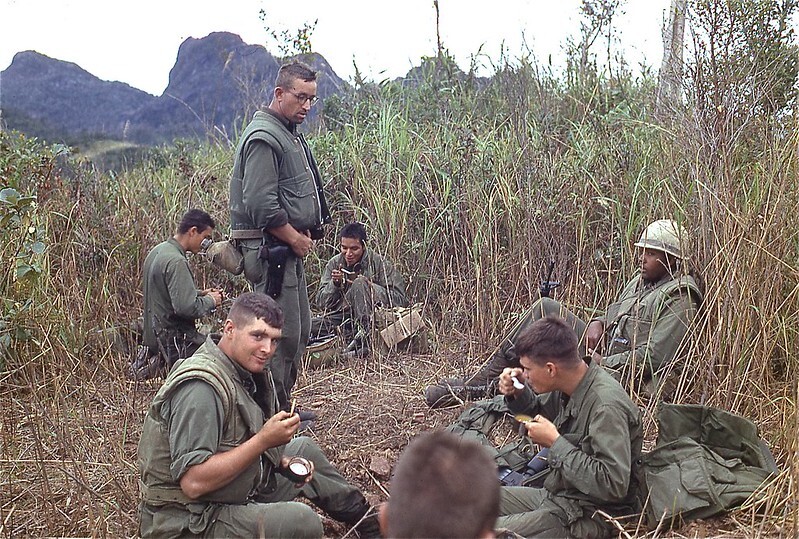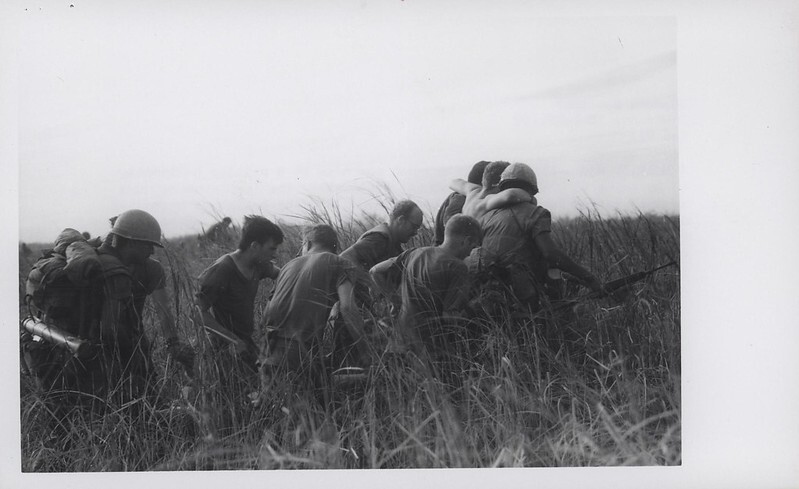"Yeah, Well They Saved My Life Every Day"
In his text The Grunts, author Charles Anderson writes about how Vietnam veterans navigated their time in the war and return to the United States. For Anderson, the most important factor to coping with both of these situations was “group unity,” which Anderson explains as all men believing in the reason for fighting. This can also be interpreted as brotherhood amongst men in the field. When recounting their experiences in Vietnam, Corpsmen paid particular attention to how important group unity was. The brotherhood was not just about believing in the fight, but rather about caring for one another. To enter into combat with Marines and be protected by them, while also having the potential to save their lives in case of disaster, defined an unbreakable brotherhood exhibited by Corpsmen in narratives about their Vietnam experience.
Jack Cassidy emphasized the importance of brotherhood during his interview. Upon first arriving in Vietnam, Jack noted how out of shape he was because of inadequate physical training between Combat Corpsman School at Camp Lejeune and actual deployment. In the first few weeks, Jack’s fellow soldiers from Kilo Company helped him carry supplies and helped him acclimate to the adverse conditions. After learning the ropes, Jack earned the nickname “Doc,” a title that stays with him even today. When asked about if he ever heard about the men he took care of later on, he told the following story. Upon returning to Philadelphia Naval Hospital, he met up with seven Marines who “all lost their legs or arms,” of whom Jack knew and took care of in the bush. When he walked up “the gangway to go see ‘em in the ward, they were all in line singing the Marine Corps hymn, saluting [him].” For Jack, this was the best feeling in the world. While being protected by the men around him, Jack saved the lives of many of his comrades, cementing this brotherhood. This is central to Jack’s Vietnam experience and his narrative.
Cahill also echoed the sentiment in his oral history interview. Feeling the immense respect granted to him by his men, Cahill reported that: “they loved their Corpsman.” Upon arriving in country, the enlisted Marines warned Cahill about what to expect, opened up to him, and were respectful; treating him differently than how they would treat the rest of the FNG (Fucking New Guy) Marines coming in. Lima Company 3/1 Corpsman Robert Slingluff commented on the brotherhood between Marines and their Corpsmen in his oral history interview as well, noting that: “it was the type of thing where they felt perhaps their life was in my hands, but at the same time I knew that my life was in their hands.” This multi-faceted responsibility centered the brotherhood in many Corpsman narratives.
Corpsman Ordonez mentioned an extreme example of his responsibility to his brothers in arms. After a dud RPG hit a helicopter he was riding in, knocked him out of it, and caused him to break his nose and suffer a concussion upon landing, the Navy transferred Ordonez to a hospital ship for a few weeks to aid in his recovery. Ordonez was not thrilled with the decision, and by Thanksgiving Day of 1969, he said: “I felt like I shouldn’t be there and I finally got out. The doctor wanted me to stay. He said, ‘I can reassign you here.’ I said, ‘No, I’ve got to get backed to my men.’”
Ordonez, Cahill, Slingluff, and Cassidy’s narratives all comment on the positive impact of the bond between Marines and their Corpsmen, as well as how far the men were willing to go to uphold it. This is something Corpsmen remembered long after the war (see "They Still Loved Their Doc.")

